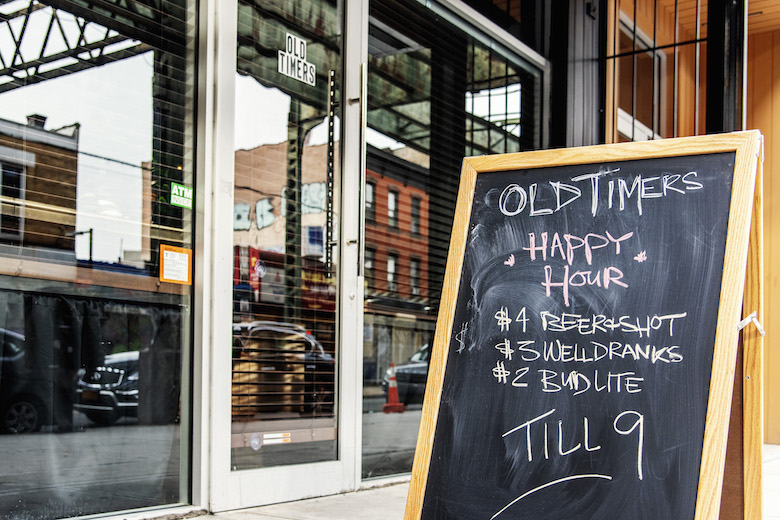
The restaurant and bar industry, especially in New York City, is notorious for its difficulty to survive. Monetizing a good time while providing cohesive offerings can be challenging for the most seasoned veteran. I’ve been a runner, server, barback, bartender, bar manager, and now operating partner of my own business in Bushwick, Brooklyn, called Old Timers. I acknowledge that there are skilled bartenders and unskilled bartenders. It is my livelihood to see the difference. It’s worth mentioning that many bartenders have a genuine affinity for hospitality. Personally, even if a patron is crossing an awkward boundary, I tell myself, “I am lucky to have customers.” Still, owing to the nature of combining booze and people, bartenders can be the butt end of some uncomfortable behavior. While bars are not universal, here is a guide for general etiquette, and helpful suggestions:
Respect that the bartender is working.
Bars are meant to be social and fun. Your bartender may ask about your day or get to know you. Understand that they are working to provide for themselves, and the establishment needs money to pay bills. If they seem like they always have one foot out of the conversation, don’t take it personally. If you are properly served, do not persistently seek their attention just to talk. Most likely they will come around to chat when their responsibilities are covered.
Respect the selection.
If the selection is not prominently displayed, ask to see a menu. Occasionally, a guest will order a specific brand of beer, and I suggest comparable varieties we serve. Some are even from local craft breweries that keep their prices competitive with large corporations. Detaching yourself from usual brands may even result in enjoying something new.
Be diligent about your cash.
This applies especially on busy weekend nights. If you exchange a drink for cash, then become distracted by talking to your friend, there is a chance the change is gone. Maybe another bartender grabbed it, assuming it was a tip. Unfortunately, it’s also possible a dishonest bar patron swiped it from the counter. Recently a guest engaged in a heated argument with a well-liked bartender, complaining they “paid $20 for a tequila-soda,” and later discovered that the change was in their pocket.
Being the owner’s friend does not entitle you to free drinks (even if you have been treated before).
“I know the owner,” is commonly heard when someone wants a free drink. The best bartenders respond, “I know them, too; I work for them.” If the owner is truly your friend, you would gladly support.
Contact management privately with a complaint before posting a scathing online review.
Once I received objectively terrible service from a restaurant I adored. Instead of posting about the server on the digital wall of shame (Yelp, Google/Facebook review, etc.), I emailed management describing the situation. They apologized and offered me a gift certificate. It was not at all my intention to acquire a free meal, but I certainly appreciated the gesture. Most of the time, managers would like a chance to right their wrongs.
A Yelper once described me as “that larger Japanese woman.” I’m 5’7”, and at the time I weighed about 160 pounds. My parents are Chinese. The “customer-is-always-right” mentality of this establishment resulted in me being chastised for being unprofessional. Although I can acknowledge that my service is not always perfect, this experience negatively impacted my ability to feel upbeat at work knowing that my boss would rather defend someone who body-shamed me on the internet. My next point:
Acknowledge the job can be more difficult for racial minorities, non-cisgender heterosexual men, LGBTQIA+ folx, and people of size.
Bartending can sometimes feel like being in a fishbowl. Bartenders exist in plain view, likely being watched by several eyes. I navigate the world as a female-presenting person of color, and I’ve endured comments that can be alarmingly both racist and sexist. There is also diversity that cannot be seen. Transgender women bartenders hear persisting comments such as, “hey man/brother,” as if acknowledging gender fluidity threatens another’s identity. These micro-aggressions wear away at the general well-being of others. We are all deeply socialized to internalize each other’s differences, but at the very least those serving you drinks deserve to be treated with compassion.



